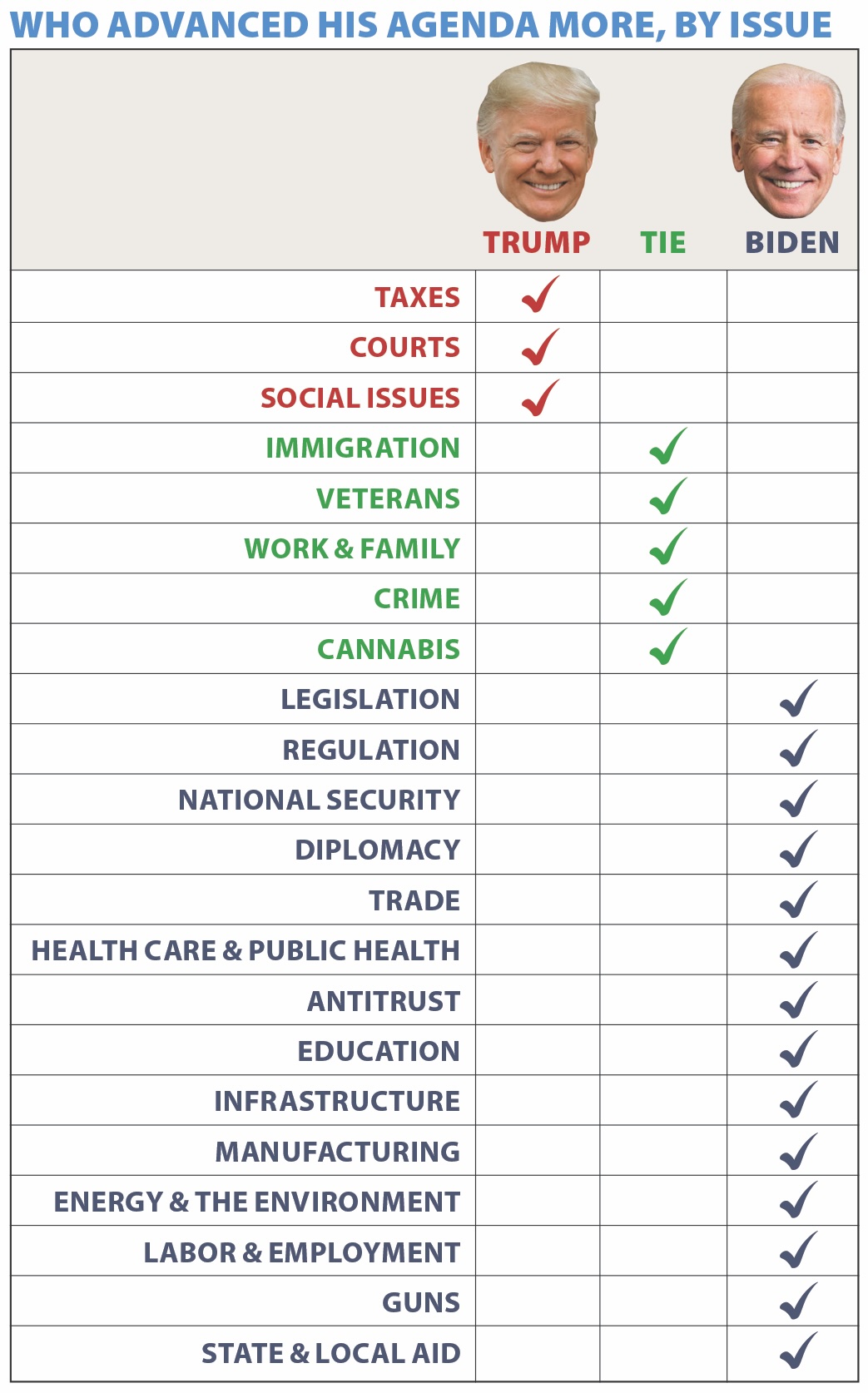It’s easy to conclude that American voters don’t care about reality these days. As the economy gets better, Joe Biden’s job approval numbers get worse. As his legal losses pile up, Donald Trump’s grip on the Republican Party tightens. Each side’s base is more motivated by fear of the other side (“negative partisanship,” political scientists call it) than by their own candidate’s record. The “low information” swing voters who will likely determine the 2024 presidential winner aren’t paying attention, and it’s not clear they will between now and November. “Facts don’t care about your feelings,” the conservative pundit Ben Shapiro famously wrote. For most voters, something like the opposite is true: Their feelings don’t care about the facts.
But some voters surely do care, including—indeed, especially—the readers of the Washington Monthly. That’s why we have devoted the feature well of the April/May/June print issue to an accounting of Trump’s and Biden’s presidential records of accomplishment.
Such an assessment is valuable in any presidential year, especially this one. A typical presidential reelection contest features an incumbent and a challenger who holds a not-quite-equivalent office—a senator, say, or a governor. This November’s race pits against each other two presidents from the major parties who served consecutively. That hasn’t happened since 1892, when Democrat Grover Cleveland challenged (and defeated) Republican Benjamin Harrison, to whom he’d lost four years earlier. The Trump-Biden comparison is even more apt—and potentially revealing—because neither president has more cause to blame Congress for their failings. The party of each all-but-certain nominee controlled both chambers during his first two years in the Oval Office, then only the Senate (by a minuscule majority) in his second two years.
Our editors spent months digging into the records of both presidents, beginning with the accomplishments each administration touts. We eliminated their least important and reliable claims and wrote short descriptions of the remaining ones by subject area in a back-to-back fashion for easy comparison. (See the index here.) We also asked 10 journalists to investigate both presidents’ records in a specific realm—the courts, national security, antitrust, etc.—and report on who got more of their respective agendas done and how.
Though the Washington Monthly is a center-left magazine, we didn’t judge the presidents’ achievements by whether we personally approve of them. Instead, we looked at what the presidents themselves wanted to accomplish. For example, Biden aimed to use federal regulations to advance his liberal agenda, whereas Trump vowed to ax regulations. So, the fair metric in that case is whether Biden has been an effective regulator and Trump a successful deregulator.
How, then, do Trump’s and Biden’s records in office stack up? Read the list and the essays and decide for yourself. We think you’ll find some surprises.
But after considering both the number and importance of each president’s achievements, here’s our takeaway (see chart).

Trump was the more successful at advancing his agenda in a few areas. That includes the courts, in part by serendipity—he was handed the opportunity to appoint three Supreme Court justices to Biden’s one, and the pattern was similar for lower court appointments, as Caroline Fredrickson explains. On taxes, Trump’s 2017 Tax Cuts and Jobs Act is his biggest legislative success; Biden had a major win with the expanded child tax credit, but he couldn’t get the policy extended beyond one year. On social issues, Trump’s appointment of a conservative Supreme Court supermajority that overturned Roe v. Wade and affirmative action was a bigger deal than Biden’s expansion of LGBTQ and other civil rights protections.
In a handful of other areas, the two presidents tied. On immigration, for instance, Trump was politically punished for his cruelty at the border, while Biden’s gentler approach hasn’t fared much better, as Marc Novicoff reports.
In most areas of governance, however, Biden got more done than Trump—in many cases, vastly more. Trump signed $6 billion in new infrastructure spending, Biden $1.2 trillion. Trump’s national security achievements are dwarfed by Biden’s biggest success: leading the international alliance against Russia to support Ukraine and his related strengthening and expanding of NATO.
What’s behind Biden’s lapping of Trump in attainment? Partly, it’s the difference in party ambition: Democrats want to use government to advance their agenda, whereas Republicans want to block the Democrats’ agenda. Mostly, the difference in achievement reflects the character of the two men. As Bill Scher observes, Biden, a skilled and patient veteran lawmaker, worked more productively with members of the opposite party and thereby signed more—and more consequential—bills than Trump, an imperious hothead. Trump hired inexperienced ideologues to run his regulatory agencies, and when their proposals were challenged in court, they were overturned 77.5 percent of the time. The average for all presidents is 30 percent, as Rob Wolfe notes.
We’re under no illusion that most voters, whether hyper-partisan or deeply disillusioned, will make careful decisions in November based on thoughtful assessments of the candidates’ records. But we still think this exercise is worthwhile, for several reasons.
First, what a president did or did not accomplish in his first term tells you a lot about what they’ll try to do in a second term—and our essayists deliver their thoughts on that.
Second, “most” voters aren’t going to determine the outcome of this presidential election. The race will likely be decided in six or seven swing states based on the campaigns’ ability to persuade or motivate a relatively small number of voters in specific demographics. Which messages will work best on which voters months from now is still unclear. It’s not unreasonable to suspect that by the fall, some aspects of the candidates’ governing records could wind up being decisive.
Third, and relatedly, as the race progresses, the candidates’ records will be increasingly trumpeted—in ads, news coverage, and, perhaps, formal debates. As Election Day approaches, political journalists, campaign operatives, and engaged citizens could use a reliable guide to weigh braggadocio against the truth. So, keep this print issue at the ready or bookmark the URL. Our scorecard will come in handy.



